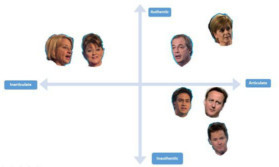They may be political opponents, but a Dundee University study has found that Nicola Sturgeon and Nigel Farage appeal to voters for the same reasons.
The Qualitative Election Study of Britain (QESB) has been quizzing voters in the run-up to Thursday’s general election about their reactions to the campaign.
It found that both First Minister Nicola Sturgeon and UKIP leader Nigel Farage enjoy far higher approval ratings than other leaders because they appear both articulate and authentic.
A TNS poll gave Ms Sturgeon a UK-wide approval rating of +33 while Nigel Farage enjoys a +12 approval rating.
David Cameron’s approval rating is +7 while Ed Miliband and Nick Clegg’s are -8 and -22 respectively.
According to research carried out by Kristi Winters and Edzia Carvalho from the QESB, “authenticity” is key to winning over voters.
They wrote: “Preliminary findings indicate that both Nicola Sturgeon and Nigel Farage hit the ‘sweet spot’ with British voters by being articulate enough to get their values and policy proposals across whilst being authentic enough to be believed.”
They continued that voters respond to politicians who are prepared to take a principled stand, even if it is one they personally disagree with.
“QESB participants gave high marks to politicians for taking a clear and sincere stance on the issues whether or not they agreed with their policy positions,” they wrote.
And they found Ms Sturgeon’s popularity stretches across the UK.
“Nicola Sturgeon came out on top in our leaders impression exercise right across Britain,” said the QESB report.
“Words such as ‘strong’ and ‘passionate’ came up time and again. In both the Welsh and English focus groups the odd participant would confess ‘I wish she was the leader of a different party’.”
The study also found Nigel Farage “was perceived as understanding of the lives of ordinary Britons” and that “he spoke in the way ordinary people spoke”.
However, his approval ratings are lower than the SNP leader’s “down to Welsh and Scottish voters having vociferously more negative views of him than English voters”.
The report added: “Nicola Sturgeon managed to transcend national boundaries with her performance, coming across as reasonable and sincere while voters across England, Scotland and Wales associated words such as ‘racist’ and ‘scary’ with Mr Farage.”
The QESB report is available here.
